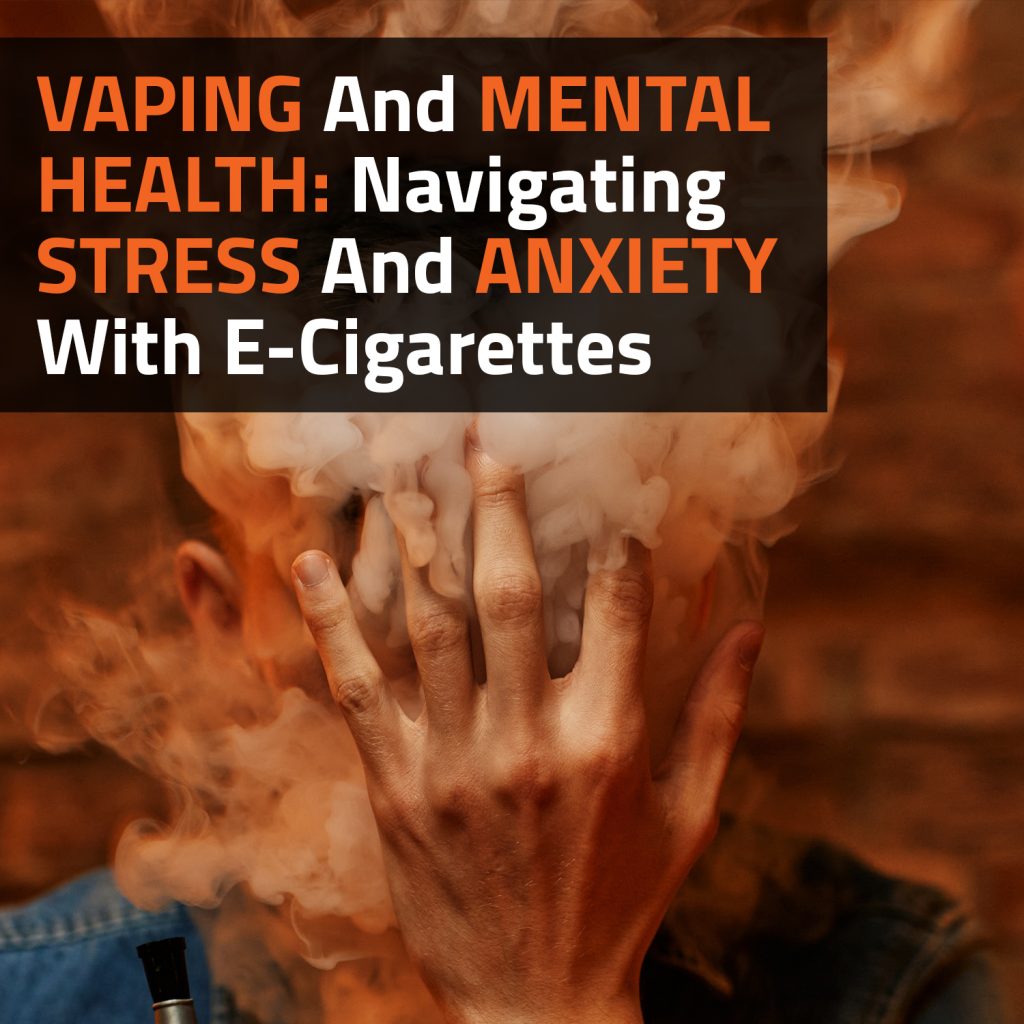In the realm of public health and wellness, the relationship between mental health and substance use has been an ongoing subject of concern and research. As we navigate the complexities of the modern world, the burden of stress and anxiety has become increasingly prevalent, affecting individuals from all walks of life. For many, coping with these emotional challenges can be a daily struggle, and some have turned to unconventional methods in search of relief.
One such method that has gained significant popularity in recent years is vaping, specifically the use of e-cigarettes. While e-cigarettes were initially introduced as an alternative to traditional smoking, they have since evolved into a broader cultural phenomenon. Advocates argue that vaping offers a safer and less harmful way to consume nicotine, potentially providing a means to reduce stress and anxiety for those who turn to smoking as a coping mechanism.
The Link Between Mental Health And Smoking
The relationship between mental health and smoking is a complex and multifaceted one, characterised by both statistical correlations and deep-seated psychological connections. Understanding this link is crucial when exploring the potential role of vaping and e-cigarettes in addressing stress and anxiety among individuals with mental health challenges.
Higher Prevalence Among Individuals With Mental Health Conditions
Research consistently shows that individuals with mental health conditions, such as depression, anxiety disorders, bipolar disorder, and schizophrenia, have a higher prevalence of smoking compared to the general population. Smoking rates among people with mental health issues are often significantly elevated. This raises important questions about the reasons behind this phenomenon.
One prevailing theory is the self-medication hypothesis, which suggests that individuals with mental health conditions may turn to smoking as a way to self-medicate or alleviate their symptoms. Nicotine, the addictive substance in cigarettes, can temporarily boost mood, improve concentration, and reduce anxiety, which may offer some relief to those experiencing emotional distress.
Coping Mechanism
Smoking is frequently used as a coping mechanism for dealing with stress, social anxiety, and other emotional challenges. The act of smoking and the ritual of taking breaks to smoke can provide a temporary distraction and a sense of relief from life’s pressures. This can be especially appealing to those who struggle with managing their mental health.
Challenges In Quitting
Individuals with mental health conditions often face more significant challenges when attempting to quit smoking. The addictive nature of nicotine, combined with the psychological dependence on smoking as a coping mechanism, can make it harder for them to successfully quit. This can further perpetuate the cycle of smoking and mental health struggles.
Biological And Genetic Factors
Some studies suggest that there may be biological and genetic factors that contribute to the link between mental health and smoking. For instance, it’s been observed that people with certain mental health conditions may have altered neurochemical pathways that make them more susceptible to nicotine addiction.
The Emergence Of E-Cigarettes
The emergence of e-cigarettes or vapes has been a significant development in the realm of tobacco and nicotine consumption. These devices were introduced as a less harmful alternative to traditional cigarettes and quickly gained popularity. Understanding the background and evolution of e-cigarettes is essential when considering their role in addressing stress and anxiety.
- Invention and early development: E-cigarettes were first invented in the early 2000s, with Chinese pharmacist Hon Lik often credited as the pioneer. These early e-cigarettes consisted of a battery-powered heating element that vaporised a liquid containing nicotine, producing an inhalable aerosol. They were initially designed as a smoking cessation aid and an alternative to combustible tobacco.
- Rapid commercialisation and popularity: Over the next decade, e-cigarettes experienced rapid commercialization and widespread adoption. Manufacturers produced a variety of devices, flavours, and nicotine concentrations, catering to a broad consumer base. The appeal of e-cigarettes lay in their potential to deliver nicotine without the harmful byproducts of combustion, such as tar and carbon monoxide, which are associated with traditional smoking.
- Appeal to smokers and new user groups: E-cigarettes appealed to different groups of users. They garnered interest from current smokers looking for a less harmful alternative and those attempting to quit smoking. Simultaneously, e-cigarettes attracted a new user base, including youth and individuals who had never smoked before, which raised concerns about potential nicotine addiction among non-smokers.
- Regulatory challenges: The rapid proliferation of e-cigarettes presented regulatory challenges for governments and health authorities. Questions arose regarding their safety, marketing to youth, and long-term health effects. Various countries adopted different regulatory approaches, ranging from outright bans to strict age restrictions and marketing regulations.
- Flavour diversity and appeal: E-cigarettes became known for their wide range of flavours, which contributed to their popularity. These flavours, while attracting users, also raised concerns about their appeal to youth and the potential risks associated with inhaling flavoured aerosols.
Vaping And Stress Relief: Myth Or Reality?
The idea of vaping as a stress-relief tool has gained attention, with proponents suggesting that using e-cigarettes can alleviate stress and anxiety. However, the actual impact of vaping on stress relief remains a topic of debate and requires a nuanced understanding.
- Perceived stress reduction: Many individuals claim that vaping helps them relax and unwind. The act of inhaling and exhaling vapour, the hand-to-mouth action, and the ritualistic nature of vaping may provide a sense of comfort or distraction, which some associate with stress relief.
- Nicotine and stress response: Nicotine, the primary addictive component in traditional cigarettes and present in many e-cigarette products, is known to have effects on the brain that can initially reduce stress and anxiety. It triggers the release of dopamine, which can create a sense of pleasure and relaxation.
- Placebo effect and psychological associations: The perceived stress relief from vaping might also stem from psychological associations. If individuals believe that vaping helps reduce stress, the placebo effect can come into play, influencing their perception of stress levels rather than any inherent properties of the vaping activity.
- Distraction and coping mechanism: Engaging in vaping may serve as a distraction or coping mechanism for some individuals dealing with stress. The act of vaping might temporarily divert attention from stressful situations or provide a break in routine, offering a sense of relief.
- Limited scientific evidence: While anecdotal reports and individual experiences exist, scientific evidence directly linking vaping to stress relief is limited and often inconclusive. Further research is required to establish a clear understanding of whether and how vaping affects stress and anxiety.
- Individual variations: It’s important to note that responses to stress relief methods, including vaping, can vary significantly among individuals. What works for one person might not work for another due to differences in psychology, biology, and personal preferences.
Understanding Nicotine And Its Effects On The Brain
Nicotine, an alkaloid, is naturally occurring in tobacco leaves, particularly in the Nicotiana tabacum plant. It is the primary reason behind the addictive nature of tobacco products due to its profound influence on brain function and behaviour.
What sets nicotine apart is its ability to rapidly cross the blood-brain barrier. When inhaled through smoking or vaping, nicotine reaches the brain within seconds, leading to swift effects on mood and cognition. This swift delivery is one of the reasons why nicotine can induce immediate feelings of pleasure, euphoria, and relaxation, which often drive individuals to turn to nicotine-containing products as a means of stress relief.
At the heart of nicotine’s impact on the brain is its role in stimulating the release of dopamine, a neurotransmitter associated with pleasure and reward. This dopamine surge is the foundation of the pleasurable feelings nicotine can induce, contributing to the sense of relaxation and relief from stress. It achieves its effects by binding to nicotinic acetylcholine receptors in the brain. These receptors are integral to various cognitive functions, including attention, memory, mood regulation, and the development of addiction.
Prolonged use of nicotine can lead to the brain adapting by reducing the number of available receptors, a process known as tolerance. This adaptation means that individuals may require increasing amounts of nicotine to achieve the same desired effects, potentially leading to dependence and addiction.
When nicotine levels in the body drop, withdrawal symptoms can manifest. These symptoms may include irritability, anxiety, restlessness, and an intense craving for nicotine, creating a cycle of dependence that reinforces the use of nicotine-containing products.
The link between mental health and smoking, both traditional and electronic, is undeniable. Individuals facing the challenges of mental health conditions have, for years, turned to nicotine as a means of coping. However, the emergence of e-cigarettes has raised intriguing questions about whether vaping can offer a safer avenue for those seeking relief from the burdens of stress and anxiety.
Ultimately, the path to improved mental health, stress management, and well-being is a multifaceted journey that extends beyond the confines of nicotine consumption. Exploring alternative, evidence-based strategies for stress relief, seeking professional guidance, and fostering a supportive environment are essential steps in this ongoing endeavour.
-
UWELL Caliburn GK2 Kit
R495.00 -
Smok Nord 50W Kit
R550.00 -
UWELL Caliburn X Pod System
R625.00 -
Uwell Caliburn A3 Pod Kit
R450.00










